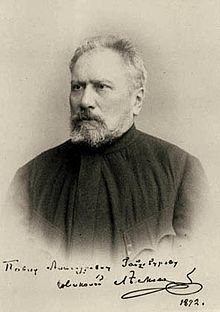The mountain (Nikolai Leskow)
The mountain ( Russian Гора , Gora ) is a story by the Russian writer Nikolai Leskow , which was published in 1890 in issues 1 to 12 of the St. Petersburg weekly Schiwopisnoje obosrenije (roughly: Picturesque look around ) under the title Zenon the Goldsmith with illustrations by Repin and Serge de Solomko appeared. The author took the material for this early Christian legend from the prologue , the Slavic version of a Synaxarion for the city of Constantinople .
Emergence
Leskov wanted to publish the text in the Moscow magazine Russkaya Mysl in 1888 . That failed because of the Russian censorship, because in the Alexandrian patriarch some wanted to recognize the Moscow metropolitan Drozdov , who died in 1867 . Finally, after a few changes, the editor Alexander Scheller found himself ready to publish the story in the weekly magazine mentioned above. The censors approved.
content
Egypt under Roman rule after Christ's crucifixion during the persecution of Christians , i.e. before 313 AD: The 31-year-old bachelor Zenon from Miletus had settled in Alexandria as a goldsmith . This artist, the son of a Greek woman and a Gaul , also worked in his studio on the banks of the Nile as a modeller, sculptor, caster and architect. The Christian community in Alexandria did not see the secret Christian Zeno as one of their own.
Zenon had promised so many rich Alexandrian women the production of golden jewelery that he had to refuse the order from the beautiful young widow Nephoris, brought by one of her servants. So the Thracian , who had been abducted to Antioch as a child and married to a rich old lecher, went there herself. Nephoris went to Alexandria because a widow was more respected there than with the Hellenes .
Nephoris, who had never made love, falls in love with the beautiful goldsmith. Zeno initially counteracts the onslaught of women with the argument of reason. He, too, flares up in love for the woman and reacts with affect: In order not to have to see the beguiling beauty so close in front of him, he stabs an eye out. Nephoris is seized with wild horror. She manages to escape to her apartment with great difficulty.
A year later, the one-eyed Zenon can go back to work. When the Nile flood , which was expected for survival, fails to materialize, Paeoch from Memphis , a descendant of Egyptian priests who lives in a cave on the Pharos peninsula , portrays the Christians living in Alexandria as the culprits for the lack of natural events. In addition, Nephoris wants revenge on Zenon for the spurned love. Paeoch, incited by this woman, takes Jesus Christ , the Christian Son of God, at his word. During his lifetime he had said that faith can move mountains. The Christians are rounded up in Alexandria. On Mount Ader they should pray to their god that he would move the mountain to the nearby Canopian arm of the Nile as a dam and that the river from Philae would overflow its banks.
The Christian Patriarch of Alexandria and all of the city's wealthy Christians fled in time. Only the bishop, Zeno and the poor remained. The bishop, an old man, lacks the vigor to lead the remaining Christians to pray on Mount Ader. If the Christians cannot move the mountain with their prayers, then they will either be drowned in the Nile or sent to the granite quarries in Aswan . Nephoris thinks that only Zeno can lead Christians to pray. However, she cannot convince the bishop of that. Nephoris acts without the help of the weak-willed bishop. She penetrates the captured Christians by pretending to be a Christian in front of the guards and convinces the prisoners: Zeno should be their leader.
Zenon follows the call of his fellow believers. When he wants to go to the governor - he wants to negotiate with him - the guards ask for a surety. Nephoris, whom Zenon still loves, turns around and poses as guarantor.
Everything will be fine on Mount Ader. A thunderstorm is coming down. The flood of rain washes the mountain into the Nile. The river is flooding.
The Egyptians slay Paeoch. Zenon and Nephoris get married
German-language editions
Output used:
- The mountain. An Egyptian story. According to ancient traditions. Translated from the Russian by Wilhelm Plackmeyer. P. 477-579 in Eberhard Reissner (Ed.): Nikolai Leskow: Collected works in individual volumes. The juggler pamphalon. 616 pages. Rütten & Loening, Berlin 1971 (1st edition)
Web links
- The text
- Entry in the Laboratory of Fantastics (Russian)
- Entry in WorldCat , translator: Johannes von Guenther
Individual evidence
- ↑ Russian Живописное обозрение стран света
- ↑ Russian Соломко, Сергей Сергеевич
- ↑ Russian prologue (book)
- ^ Reissner in the follow-up to the edition used, p. 602, 2nd Zvu and p. 604 middle
- ↑ Russian Alexander Scheller
- ^ Reissner in the follow-up to the edition used, p. 604, 17. Zvo
- ↑ "... if you say to this mountain: Rise up and throw yourself into the sea !, it will happen." ( Matthew 21 : 18-22 EU )
- ↑ Russian Адер
